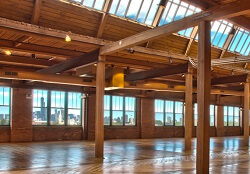Museums. Arenas. College Campuses. All of them can be used as a unique option for your next corporate meeting or event—and many have beneficial advantages over traditional venues. Yet, like any event location, it’s good to have all the information up front before making a decision. Here we look at some of the rules of the road in working with a unique space, including green lights and detours.
many have beneficial advantages over traditional venues. Yet, like any event location, it’s good to have all the information up front before making a decision. Here we look at some of the rules of the road in working with a unique space, including green lights and detours.
Reasons to Green Light:
- Value: When you compare traditional venues such as a hotel to a unique event venue, you’ll find significant price reductions. This is because the core mission of these sites is not event revenue. Campus venues, for example, already havebuilt-in technology for their students, which means there’s typically little or no add-on fee for planners.
- The setting: Unique spaces are already unique, which means you don’t have to spend a lot of time or money adding atmosphere or décor. A museum’s exhibits, for example, can be a great way to enhance your theme.
- Wow factor: You never hear people say, “I can’t wait to go to that meeting in the hotel ballroom,” but notice the reaction when you announce the conference will be held in a movie theatre. A change in place can help build buzz (and attendance).
- The pros: A lot of planners are pleasantly surprised to find a staff of professionals at a unique event location. Part-time or not, these individuals know their business and can help you make the most of the facility.
Be Aware of Detours:
- Picking a date: For many of the unique venue sites, hosting meetings and special events is secondary to their core mission. So you may have to schedule around college classes, sports games at arenas or exhibits at the museums. Venues will be upfront about their availability; if you’re flexible with dates, these sites can be a great option.
- Part-time staff: While some unique spaces DO have special event offices or departments, you may run across one that employs a part-time event coordinator or a person who multitasks with other roles. The knowledge and professionalism is still abundant, you may just have to adjust to a different model than traditional venues.
- What’s on the menu: There’s no standard at unique spaces. Some have exclusive onsite caterers, others have a preferred list. In some cases, you’ll have to supply your own. Make sure you know the food and beverage options ahead of time.
- Extra insurance: For some venues, you may be required to provide a certificate of insurance because the property may not have a policy covering your event. Add-ons are usually very affordable and can be a simple rider on your existing policy.
AMI welcomes Chuck Salem as our guest blogger this week. Chuck has nearly 18 years experience in the meeting and events industry and is a Past President of the Association of Collegiate Conference and Events Directors International (ACCED-I) and also served as the Chairman of the ACCED-I Benchmarking Project Team, leading the effort for the first comprehensive university conference industry benchmarking and best practices study in North America. Currently, Chuck Salem serves as President of Unique Venues and www.uniquevenues.com



